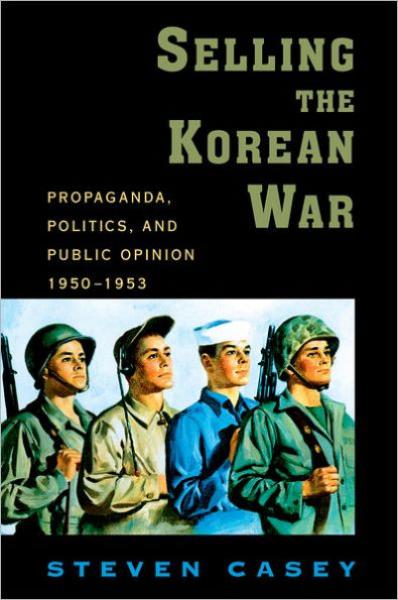Description
Based on a massive array of primary sources, Casey subtly explores the government's selling activities from all angles. He looks at the halting and sometimes chaotic efforts of Harry Truman and Dean Acheson, Dwight Eisenhower and John Foster Dulles. He examines the relationships that they and their subordinates developed with a host of other institutions, from Congress and the press to Hollywood and labor. And he assesses the complex and fraught interactions between the military and war correspondents in the battlefield theater itself.
From high politics to bitter media spats, Casey guides the reader through the domestic debates of this messy, costly war. He highlights the actions and calculations of colorful figures, including Senators Robert Taft and JHoseph McCarthy, and General Douglas MacArthur. He details how the culture and work routines of Congress and the media influenced political tactics and daily news stories. And he explores how different phases of the war threw up different problems - from the initial disasters in the summer of 1950 to the giddy prospects of victory in October 1950, from the massive defeats in the wake of China's massive intervention to the lengthy period of stalemate fighting in 1952 and 1953.
Steven Casey has drawn a masterly analysis of what is certain to become the standard work on its subject...The whole study is, moreover, conveyed with real verve and at a cracking pace...An exceptionally good book which does full justice to the complexity of the comestic politics of the Korean War and the rold of the media, official institutions, and politicians in shaping public opinion.--Matthew Jones, Journal of American Studies
Casey provides the best account to date of the relationship between domestic politics and the war in Korea...His book is a significant contribution to the literature on the Korean conflict and the relationship between politics and diplomacy during the early years of the Cold War. Most impressive is the author's ability to place the war in a broader context.--Thomas W. Devine, H-Diplo Roundtable Reviews
As a study on the complex relationship among the executive branch, congress, the media, and the public within a constitutional democracy, Dr. Casey's Selling the Korean War is unparalleled in both detail and insight. It is a major addition to the literature--in any language--on the Korean War, and merits a careful read by all who share an interest in the subject.--Sung-Yoon Lee, H-Diplo Roundtable Reviews
This careful study not only fills a notable gap in the literature on the Korean War, it also makes a valuable addition to the short list of books dealing with the conflict's impact on domestic affairs inside the United States. Although Casey's main purpose is to explain ' the government's efforts to sell the war at home, ' he achieves much more in persuasively challenging the conventional wisdom about well-known key events and advancing perceptive new interpretations of old issues.--James I. Matray, H-Diplo Roundtable Reviews
This well-written and thoughtfully argued study...warrants reading not only by specialists on the Korean War but also by those interested in the crucial foreign policy debates which occurred during the final third of Truman's presidency.--Wilson D. Miscamble, H-Diplo Roundtable Reviews
This is, quite simply, a fantastically good book. Steven Casey's exhaustively researched account of the hesitant, ambivalent effort to sell America's first limited war to a reluctant public is a brilliant evocation and analysis of the domestic shape of the Korean War. Comparisons between the wars in Iraq/Afghanistan and Vietnam are commonplace; readers may be surprised to discover how much of the present dilemmas of U.S. foreign policy were pre-figured over half a century ago.--Marilyn B. Young, co-editor of Iraq and the Lessons of Vietnam: Or How Not to Learn from the Past
An exhaustively researched, highly readable, and path-breaking study of the American political process experiencing the stresses of the nation's first large-scale limited war. It is required reading not only for students of the Korean era, but also for anyone wishing to understand the divisiveness and rancor that recurred in Vietnam and, most recently, in Iraq.--Ralph B. Levering, author of The Cold War: A Post-Cold War History
As a long-time claimant of expertise on the Korean War, I am humbled by how much I learned from this well-written book, both in information combed from the archives and in penetrating insight.--William Stueck, author of Rethinking the Korean War
A masterly analysis certain to become the standard work on it subject...The whole study is conveyed with real verve and at a cracking pace.--Matthew Jones, Journal of American Studies
An exhaustively researched and insightful volume...[that] breaks new ground in the analysis of the postwar era's first limited war. Steven Casey has convincingly shown that, because of its unique place in Cold War history, the Korean War produced unprecedented ambivalence in the American national consciousness.--American Communist History
Exquisitely documented and exceptionally detailed.--Tae Yang Kwak, Journal of World History
Product Details
- Oxford University Press, Brand
- Mar 17, 2010 Pub Date:
- 0199738998 ISBN-10:
- 9780199738991 ISBN-13:
- 488 Pages
- 9.21 in * 6.14 in * 0.99 in Dimensions:
- 2 lb Weight:




